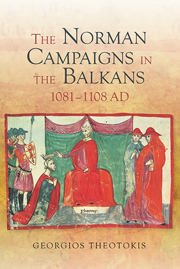Book contents
- Frontmatter
- Contents
- Acknowledgements
- List of abbreviations
- Map I Southern Italy and Sicily
- Map II The island of Sicily
- Map III The southern Balkan peninsula
- Genealogical table: The Norman dukes
- Dedications
- Introduction
- 1 Primary Sources and the Problems of Military History
- 2 Norman Military Institutions in Southern Italy in the Eleventh Century
- 3 The Byzantine Army of the Tenth and Eleventh Centuries
- 4 The Byzantine Naval Forces of the Tenth and Eleventh Centuries
- 5 The Establishment of the Normans in Southern Italy and Sicily
- 6 Robert Guiscard's Invasion of Illyria
- 7 The Norman Advances in the Balkans and the End of the Dream
- 8 Bohemond of Taranto and the First Crusade
- 9 The Count's Campaign of 1107 and the Treaty of Devol
- Conclusions
- List of Byzantine Emperors
- The Hauteville family
- Glossary
- Bibliography
- Index
Conclusions
Published online by Cambridge University Press: 05 October 2014
- Frontmatter
- Contents
- Acknowledgements
- List of abbreviations
- Map I Southern Italy and Sicily
- Map II The island of Sicily
- Map III The southern Balkan peninsula
- Genealogical table: The Norman dukes
- Dedications
- Introduction
- 1 Primary Sources and the Problems of Military History
- 2 Norman Military Institutions in Southern Italy in the Eleventh Century
- 3 The Byzantine Army of the Tenth and Eleventh Centuries
- 4 The Byzantine Naval Forces of the Tenth and Eleventh Centuries
- 5 The Establishment of the Normans in Southern Italy and Sicily
- 6 Robert Guiscard's Invasion of Illyria
- 7 The Norman Advances in the Balkans and the End of the Dream
- 8 Bohemond of Taranto and the First Crusade
- 9 The Count's Campaign of 1107 and the Treaty of Devol
- Conclusions
- List of Byzantine Emperors
- The Hauteville family
- Glossary
- Bibliography
- Index
Summary
Norman infiltration in the Italian peninsula can be viewed as the story of a few hundred men who descended upon Italy to make a career for themselves as mercenaries, as soldiers of fortune. These people were predominantly Norman, as most of our sources agree, but perhaps as many as a third of them were immigrants from regions neighbouring Normandy, such as Maine, Anjou and Brittany. In this light, one should expect them to have attempted to introduce into Italy an administrative system based on their own experience at home, influenced no doubt by the forms of lord–vassal relations, and the customs of tenure, military service and inheritance established in Normandy and other parts of France in the previous decades.
The political and social backdrop of southern Italy was ideal for them, as the politically fragmented Lombard principalities, the Byzantine catepans, the great ecclesiastical institutions of the time and even the German emperors were more than willing to hire these fine cavalrymen into their service. A sharp distinction, however, should be drawn between the pre-Civitate period and that which followed the battle at the River Fortone in 1053. Civitate should be viewed as a pivotal moment in Italian medieval history for the simple reason that it established the Normans as a major player in the political arena of Italy. For the first four decades leading up to Civitate, the Normans served in Lombard rebel armies as elite cavalry units in a conspicuously auxiliary role. Their low numbers (just a few hundred) rendered them unable to influence Italian politics to any great measure.
- Type
- Chapter
- Information
- The Norman Campaigns in the Balkans, 1081-1108 AD , pp. 215 - 222Publisher: Boydell & BrewerPrint publication year: 2014



